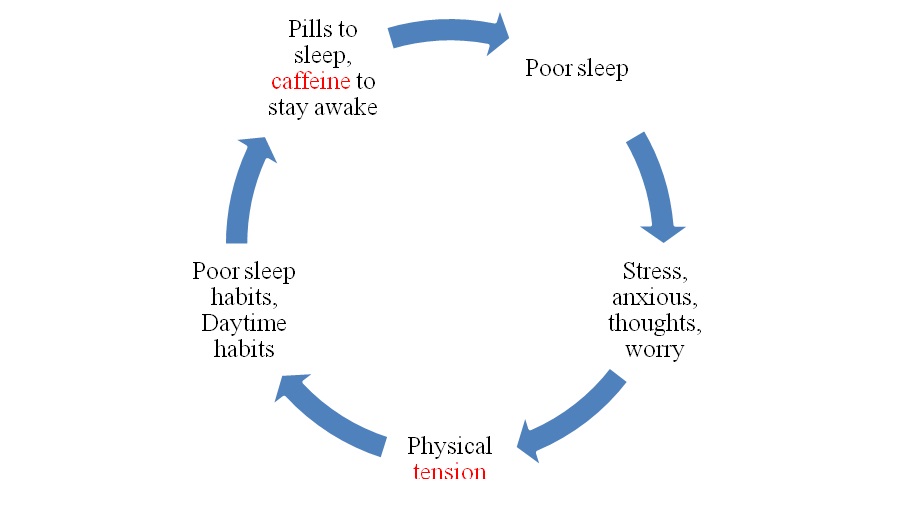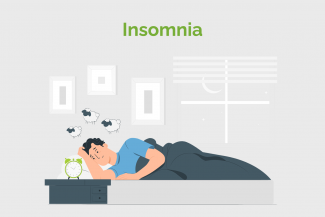
Treatment
The doctor may recommend some of the following:
Lifestyle changes can help relieve acute (short-term) insomnia. These changes might make it easier to fall asleep and stay sleep.
1. Adopting new habits to help you sleep, for instance:
- Make sure your bedroom is quiet, dark, and cool. Noise, light, and heat can interfere with sleep.
- Stick to a regular sleep schedule. Support your biological clock by going to bed and getting up at the same time every day, including weekends, even if you’re tired. This will help in getting a regular sleep rhythm.
- Avoid naps. Napping during the day can make it more difficult to sleep at night.
- Avoid stimulating activity and stressful situations before bedtime.This includes vigorous exercise, big discussions or arguments, and TV, computer, or video game use.
- Don’t read from a backlit device (such as an iPad). If you use an eReader, opt for one that is not backlit.
- Limit caffeine, alcohol and nicotine. Stop drinking caffeinated beverages at least eight hours before bed. Avoid drinking alcohol in the evening; while alcohol can make you feel sleepy, it interferes with the quality of your sleep. Quit smoking or avoid it at night, as nicotine is a stimulant.
2. Preparing your brain for sleep: The brain produces the hormone melatonin, which helps to regulate the sleep-wake cycle. As melatonin is controlled by light exposure, not enough natural light during the day can make your brain feel sleepy, while too much artificial light at night can suppress production of melatonin and make it harder to sleep. To help naturally regulate your sleep-wake cycle, you should either:
- Increase light exposure during the day, or
- Limit artificial light at night.
3. Coping with shift work: Working nights or irregular shifts can disrupt your sleep schedule. This can be avoided by practising healthy bedtime habits and by following some of these tips:
- Adjusting sleep-wake cycle
- If you can, limit the number of night or irregular shifts you work in a row to prevent sleep deprivation mounting up.
- Avoid frequently rotating shifts so you can maintain the same sleep schedule.
- Avoid a long commute that cuts into your sleep time.
- Eliminate noise and light from your bedroom during the day. Use blackout curtains or a sleep mask, turn off the phone, and use ear plugs or a soothing sound machine to block out daytime noise.
4. Neutralising anxiety when you can’t sleep: If sleep worries are getting in the way of your ability to unwind at night, the following strategies may help:
- Use the bedroom only for sleeping and sex
- Get out of bed when you can’t sleep
- Move bedroom clocks out of view
5. Relaxation techniques that can help you sleep: It takes regular practice to master relaxation techniques but the benefits can be huge. You can do them as part of your bedtime routine and if you wake up in the middle of the night:
- Abdominal breathing: When we breathe deeply and fully, involving not only the chest, but also the belly, lower back, and ribcage, it can help relaxation. Close your eyes and take deep, slow breaths, making each breath even deeper than the last. Breathe in through your nose and out through your mouth.
- Progressive muscle relaxation. Lie down or make yourself comfortable. Starting with your feet, tense the muscles as tightly as you can. Hold for a count of 10, and then relax. Continue to do this for every muscle group in your body, working your way up from your feet to the top of your head.
Dietary supplements for insomnia : There are many dietary and herbal supplements marketed for sleep-promoting effects. Some remedies, such as lemon balm or chamomile tea, are generally harmless, while others can have side effects and interfere with other medications.Two of the most popular supplements are:
- Melatonin, a naturally occurring hormone that your body produces at night. Evidence suggests that melatonin supplements may be effective for short-term use. However, there are potential side-effects, including drowsiness.
- Valerian, a herb with mild sedative effects that may help you sleep better.
Cognitive behavioral therapy (CBT) for insomnia : This targets the thoughts and actions that can disrupt sleep. See the picture below - The vicious cycle of Insomnia

It is non-medication treatment for insomnia. It addresses the thoughts and behaviours that keep you from sleeping well and helps you learn new strategies to sleep better. The main aim of this therapy is:
- To replace sleep anxiety with more positive thinking
- Involves talking with a therapist one-on-one or in group sessions
- Focuses on limiting the time you spend in bed awake
- Meet therapist weekly over 2 to 3 months
Depending upon the need, the sleep therapist may suggest some of the following techniques:
- Stimulus control therapy: This helps to remove factors that condition the mind to resist sleep
- Sleep restriction: This decreases the time you spend in bed
- Sleep hygiene: Making lifestyle changes
- Sleep environment improvement: This creates a comfortable sleep environment
- Relaxation training: This calms your mind and body
- Remaining passively awake: This involves avoiding any effort to fall asleep
- Biofeedback: This allows us to observe biological signs such as heart rate and muscle tension
Medications
Over the counter (OTC) sleeping pills is an anti-histaminine, generally taken for allergies, hay fever and common cold. They are meant to be used for short term insomnia only. Sleep experts do not advise their use because of side effects. Other over the counter (OTC) products includes melatonin, L-tryptophan supplements and valerian teas or extracts.

















